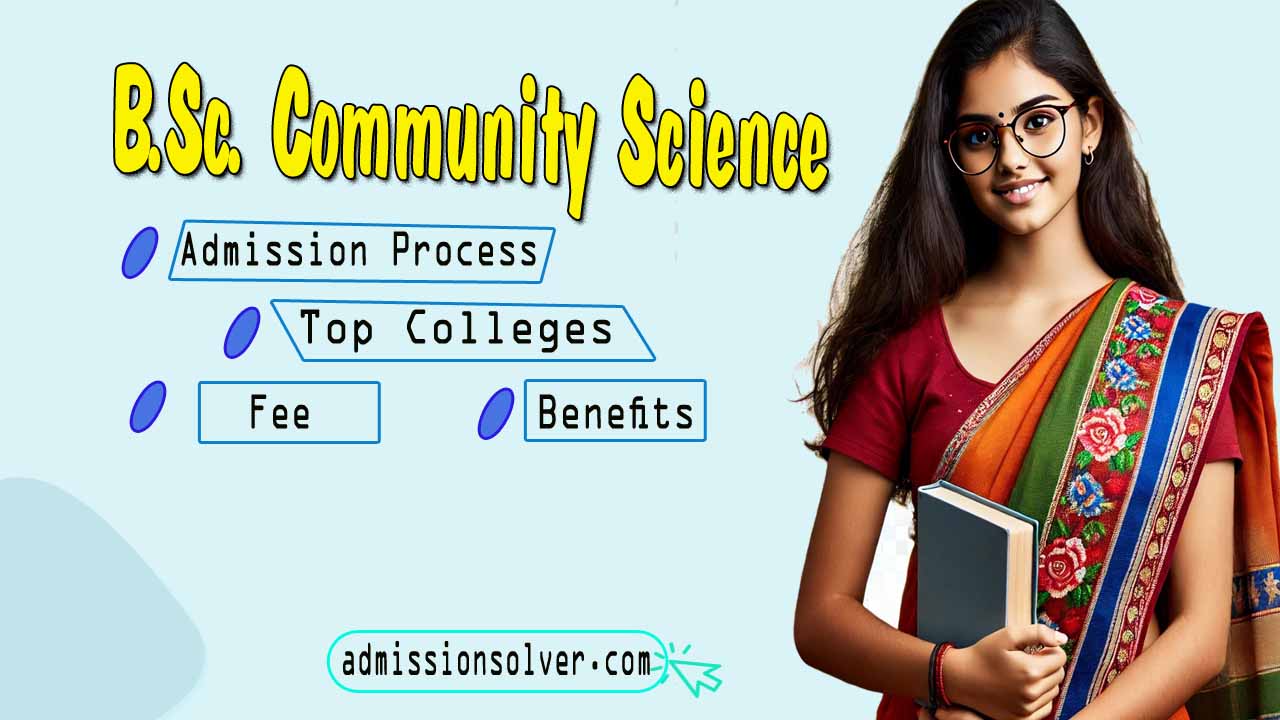B.Sc. Community Science Course: Community Science, formerly known as Home Science, is an interdisciplinary field that focuses on human development, family and community health, food and nutrition, resource management, and social well-being. Pursuing a B.Sc. in Community Science equips students with the knowledge and skills needed to improve the quality of life in households and communities. This blog provides a detailed guide on B.Sc Community Science, covering eligibility, admission process, syllabus, career opportunities, and salary prospects.
What is B.Sc. Community Science?
B.Sc. Community Science is a four-year undergraduate program that integrates scientific knowledge with practical applications in community welfare, nutrition, child development, and resource management. The course prepares students for careers in education, research, healthcare, food industries, and social work.
| Check More related courses for Admission. |

B.Sc. Community Science
Eligibility Criteria for B.Sc. Community Science
To apply for B.Sc Community Science, candidates must meet the following criteria:
1. Educational Qualification
- Must have completed 10+2 (Science/Arts/Commerce stream) from a recognized board.
- Preference is given to students with Science (Physics, Chemistry, and Biology/Home Science/Mathematics).
2. Minimum Marks Requirement
- General Category: 50%-60% in 12th standard
- Reserved Category (SC/ST/OBC): 45%-50% (varies by university)
3. Age Limit
- Minimum age: 17 years
- Maximum age: 25 years (varies by institution)
Admission Process for B.Sc. Community Science 2025
Admission to B.Sc Community Science programs is conducted via entrance exams or merit-based selection. Below are the key entrance exams for 2025:
| Entrance Exam | Conducting Body | Admission Mode |
| ICAR AIEEA | Indian Council of Agricultural Research | National-level |
| CUET (UG) | National Testing Agency (NTA) | University-level |
| State CETs | Respective State Authorities | State-level |
| University-Specific Exams | Private & Government Universities | Institutional |
Steps to Apply for Admission
- Check Eligibility – Ensure you meet the educational qualifications and entrance exam requirements.
- Register for Entrance Exam – Apply online through the official website of ICAR AIEEA, CUET, or state-level CETs.
- Appear for the Exam – Clear the entrance test with the required cutoff marks.
- Counselling & Seat Allotment – Qualified candidates are invited for counselling based on merit.
- Final Admission – Selected candidates complete document verification and fee submission.
Syllabus for B.Sc. Community Science
The syllabus covers a mix of theoretical and practical subjects, including:
Core Subjects in B.Sc Community Science
- Human Development & Family Studies
- Food Science & Nutrition
- Textile & Apparel Science
- Resource Management & Consumer Studies
- Agricultural Extension & Communication
- Home Science Extension & Rural Development
- Public Health & Community Nutrition
- Entrepreneurship Development & Business Management
- Family Resource Management
- Gender & Women Empowerment Studies
Career Opportunities After B.Sc. Community Science
Graduates can explore diverse job profiles in both government and private sectors:
| Job Role | Sector |
| Nutritionist & Dietitian | Healthcare & Wellness Centers |
| Community Development Officer | NGOs & Government Welfare Programs |
| Home Science Consultant | Education & Research |
| Food Technologist | Food Processing & Safety Industry |
| Extension Officer | Agricultural & Rural Development |
| Quality Control Analyst | Textile & Apparel Industry |
| Social Worker | Public Health & Social Services |
Top Recruiters
- Government Health & Nutrition Programs (ICDS, NRHM, FSSAI)
- Food Processing & Dairy Industries
- Textile & Apparel Companies
- NGOs & Community Welfare Organizations
- Research Institutions & Universities
- Consumer Awareness & Advocacy Groups
Salary After B.Sc. Community Science
Salaries vary depending on experience, specialization, and industry. Here’s an estimate:
| Job Profile | Average Salary (INR per annum) |
| Nutritionist & Dietitian | ₹4-8 LPA |
| Community Development Officer | ₹5-10 LPA |
| Home Science Consultant | ₹4-7 LPA |
| Food Technologist | ₹5-12 LPA |
| Extension Officer | ₹5-9 LPA |
| Quality Control Analyst | ₹6-10 LPA |
| Social Worker | ₹4-7 LPA |
Higher Studies & Specializations
After B.Sc. Community Science, students can pursue M.Sc. or diploma courses in specialized fields such as:
- Sc. in Food & Nutrition
- Sc. in Human Development
- Sc. in Community Resource Management
- Sc. in Family and Child Welfare
- Sc. in Public Health Nutrition
- D. in Community Science
Why Choose B.Sc Community Science?
Growing Demand: With increasing awareness of nutrition, health, and community welfare, professionals in this field are in high demand. Government Job Opportunities: Community science graduates can work in government departments, rural development agencies, and public health sectors. Diverse Career Paths: Work in hospitals, NGOs, education, food industries, or research institutions. Positive Social Impact: Contribute to improving quality of life, women empowerment, and child welfare.
In Brief
A B.Sc. Community Science is an excellent choice for students passionate about community welfare, nutrition, family studies, and social development. With growing demand for community science professionals in various industries, this field offers immense career growth, innovation, and job stability.
If you’re looking for a career that combines science, social service, and community development, start preparing for B.Sc. Community Science admissions today!